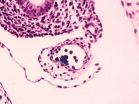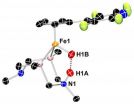(Press-News.org) A Michigan State University researcher is looking to give exercise enthusiasts the extra nudge they need during a workout, and her latest research shows that a cyber buddy can help.
The study, which appears in the Games for Health Journal, is the first to indicate that although a human partner is still a better motivator during exercise, a software-generated partner also can be effective.
"We wanted to demonstrate that something that isn't real can still motivate people to give greater effort while exercising than if they had to do it by themselves," said Deborah Feltz, a University Distinguished Professor in MSU's kinesiology department who led the study with co-investigator Brian Winn, associate professor in MSU's College of Communication Arts and Sciences.
The implications from the research also could open the door for software and video game companies to create cyber buddy programs based on sport psychology.
"Unlike many of the current game designs out there, these results could allow developers to create exercise platforms that incorporate team or partner dynamics that are based on science," said Feltz.
Using "CyBud-X," an exercise game specifically developed for Feltz's research, 120 college-aged participants were given five different isometric plank exercises to do with one of three same-sex partner choices.
Along with a human partner option, two software-generated buddies were used – one representing what looked to be a nearly human partner and another that looked animated. The participant and partner image were then projected onto a screen via a web camera while exercising.
The results showed that a significant motivational gain was observed in all partner conditions.
"Even though participants paired with a human partner held their planks, on average, one minute and 20 seconds longer than those with no partner, those paired with one of the software-generated buddies still held out, on average, 33 seconds longer," said Feltz.
Much of Feltz's research in this area has focused on the Köhler Motivation Effect, a phenomenon that explains why people, who may not be adept exercisers themselves, perform better with a moderately better partner or team as opposed to working out alone.
Her findings give credence that programs such as "CyBud-X" can make a difference in the way people perform.
"We know that people tend to show more effort during exercise when there are other partners involved because their performance hinges on how the entire team does," she said. "The fact that a nonhuman partner can have a similar effect is encouraging."
INFORMATION:
The National Heart, Lung and Blood Institute at the National Institutes of Health funded the study. Other MSU researchers on the project included Karin Pfeiffer, associate professor in kinesiology, and Norbert Kerr, professor of social science psychology.
Michigan State University has been working to advance the common good in uncommon ways for more than 150 years. One of the top research universities in the world, MSU focuses its vast resources on creating solutions to some of the world's most pressing challenges, while providing life-changing opportunities to a diverse and inclusive academic community through more than 200 programs of study in 17 degree-granting colleges.
Cyber buddy is better than 'no buddy'
2014-04-23
ELSE PRESS RELEASES FROM THIS DATE:
Male or female?
2014-04-23
This news release is available in French and German. Man or woman? Male or female? In humans and other mammals, the difference between sexes depends on one single element of the genome: the Y chromosome. It is present only in males, where the two sexual chromosomes are X and Y, whereas women have two X chromosomes. Thus, the Y is ultimately responsible for all the morphological and physiological differences between males and females.
But this has not always been the case. A very long time ago, the X and Y were identical, until the Y started to differentiate from the ...
Hundreds of genetic mutations found in healthy blood of a supercentenarian
2014-04-23
April 23, 2014 – Genetic mutations are commonly studied because of links to diseases such as cancer; however, little is known about mutations occurring in healthy individuals. In a study published online in Genome Research, researchers detected over 400 mutations in healthy blood cells of a 115-year-old woman, suggesting that lesions at these sites are largely harmless over the course of a lifetime.
Our blood is continually replenished by hematopoietic stem cells that reside in the bone marrow and divide to generate different types of blood cells, including white blood ...
From liability to viability: Genes on the Y chromosome prove essential for male survival
2014-04-23
CAMBRIDGE, Mass. (April 23, 2014) – Despite a well-documented history of dramatic genetic decay, the human Y chromosome has over the course of millions of years of evolution managed to preserve a small set of genes that has ensured not only its own survival but also the survival of men. Moreover, the vast majority of these tenacious genes appear to have little if any role in sex determination or sperm production.
Taken together, these remarkable findings—published this week in the journal Nature—suggest that because these Y-linked genes are active across the body, they ...
New target for prostate cancer resistant to anti-hormone therapies
2014-04-23
ANN ARBOR, Mich. — Prostate cancer becomes deadly when anti-hormone treatments stop working. Now a new study suggests a way to block the hormones at their entrance.
Researchers from the University of Michigan Comprehensive Cancer Center have found that a protein called BET bromodomain protein 4 binds to the hormone androgen receptor downstream of where current therapies work – targeting androgen receptor signaling.
This could mean that when prostate cancer becomes resistant to current treatments, it might remain sensitive to a drug that targets BET bromodomain proteins. ...
Quality control guidelines for genomics studies
2014-04-23
Sequencing an entire human genome is faster and cheaper than ever before, leading to an explosion of studies comparing the genomes of people with and without a given disease. Often clinicians and researchers studying genetic contributions to a certain disease encounter variations that appear to be responsible, only to find other people with the same mutation who don't have the disease or who are affected to a lesser degree.
How do doctors pinpoint the genetic changes that really cause disease? An open-access policy paper to be published Wednesday in Nature proposes guidelines ...
Picky male black widow spiders prefer well-fed virgins
2014-04-23
New University of Toronto Scarborough research shows that male black widow spiders prefer their female mates to be well-fed virgins – a rare example of mate preference by male spiders.
The study, authored by UTSC post-doc Emily MacLeod and Maydianne Andrade, a professor in UTSC's Department of Biological Sciences, found in both controlled field studies and the wild that males overwhelmingly chose to mate with well-fed, unmated females. They also found male black widows can tell whether a potential mate is well-fed and unmated by pheromones released by females.
"This ...
Halving hydrogen
2014-04-23
RICHLAND, Wash. -- Like a hungry diner ripping open a dinner roll, a fuel cell catalyst that converts hydrogen into electricity must tear open a hydrogen molecule. Now researchers have captured a view of such a catalyst holding onto the two halves of its hydrogen feast. The view confirms previous hypotheses and provides insight into how to make the catalyst work better for alternative energy uses.
This study is the first time scientists have shown precisely where the hydrogen halves end up in the structure of a molecular catalyst that breaks down hydrogen, the team reported ...
Increased infrastructure required for effective oil spill response in US Arctic
2014-04-23
WASHINGTON – A changing climate is increasing the accessibility of U.S. Arctic waters to commercial activities such as shipping, oil and gas development, and tourism, raising concern about the risk of oil spills. A new report from the National Research Council says that a full suite of proven oil response tools is needed to address potential oil spills in U.S. Arctic waters, but not all of them are readily available. While much is known about both oil behavior and response technologies in ice-covered environments, there are areas where additional research would enable ...
On the defensive
2014-04-23
People diagnosed with Huntington's disease, most in their mid-thirties and forties, face a devastating prognosis: complete mental, physical, and behavioral decline within two decades. "Mutant" protein clusters, long blamed for the progression of the genetic disease, have been the primary focus of therapies in development by pharmaceutical companies. But according to new research from Prof. Gerardo Lederkremer and Dr. Julia Leitman of Tel Aviv University's Department of Cell Research and Immunology, in collaboration with Prof. Ulrich Hartl of the Max Planck Institute for ...
ASTRO issues guideline on the role of postoperative radiation therapy for endometrial cancer
2014-04-23
Fairfax, Va., April 23, 2014— The American Society for Radiation Oncology (ASTRO) has issued a new guideline, "The Role of Postoperative Radiation Therapy for Endometrial Cancer: An ASTRO Evidence-Based Guideline," that details the use of adjuvant radiation therapy in the treatment of endometrial cancer. The guideline's executive summary is published in the May-June 2014 issue of Practical Radiation Oncology (PRO), the official clinical practice journal of ASTRO. The full-length guideline is available as an open-access article online at http://www.practicalradonc.org.
ASTRO's ...




